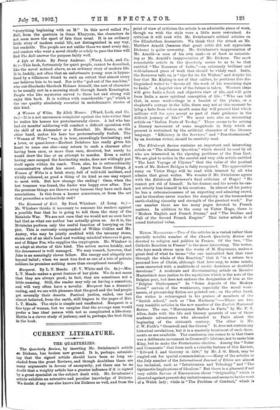CURRENT LITERATURE.
THE QUARTERLIES.
The Quarterly Review, by inserting Mr. Swinburne's article en Dickens, has broken new ground. It is, perhaps, astonish- ing that the signed article should have been so long ex- cluded from the great Reviews, and though doubtless there are many arguments in favour of anonymity, yet there can be no doubt that a weighty article has a greater influence if it is signed by a great specialist on the subject dealt with. Mr. Swinburne's article exhibits an extensive and peculiar knowledge of Dickens. We doubt if any one else knows his Dickens as well, and from the point of view of criticism the article is an admirable piece of work, though we wish the style were a little more restrained. As criticism it will rank with Mr. Swinburne's critical articles on the Elizabethan dramatists. We think that the attack on Mr. Matthew Arnold (because that great critic did not appreciate Dickens) is quite unworthy. Mr. Swinburne's inappreciation of Mr. Arnold—a man of his own rank—is at least as astonish- ing as Mr. Arnold's inappreciation of Mr. Dickens. The most remarkable article in the Quarterly seems to us to be that entitled "The Romance of India,"—an extremely brilliant and well-informed piece of work that should be widely read. India, the Reviewer tells us, is "ripe for its Sir Walter," and despite his fear that Mr. Kipling is not of that calibre, he petitions this dis- tinguished writer to " devote all the work of his remaining days to India." A hopeful view of the future is taken. Western ideas will give India a fresh and objective view of life, and will gain from India a more spiritual conception of life : " Who can tell that, in some mud-cottage in a hamlet of the plains, or a shepherd's cottage in the hills, there may not at this moment be lying a babe from whose mouth some day will proceed that which millions will for ages accept as part of their guidance in the difficult journey of life ? " We must note also an interesting article on "Italian Poets of To-day." There seems to be arising a literary movement of some magnitude in Italy which at present is restrained by the artificial character of the literary language. "Efficiency in the Services," and "Pan-Germanism," by an Austrian writer, should be carefully read.
The Edinburgh Review contains an important and interesting article on " The Albanian Question," which should be read by all who are interested in the ripening problems of the Near East. We are glad to notice in the careful and very able article entitled " The Last Voyage of Ulysses " that the value of the poetical work of Mr. Robert Bridges is fully recognised. The appreciative essay on Victor Hugo will be read with interest by all who admire that great writer. We wonder if Mr. Swinburne agrees with the Edinburgh Reviewer's final criticism of Hugo ? " Ho cannot get rid of himself. In his dramas and his novels he can- not utterly lose himself in his creations. In almost all his poetry he has a subconsciousness of an expecting and admiring crowd, and he therefore never reaches the simplicity or the tremendous earth-shaking sincerity and strength of the greatest work." For one number there are too many pages devoted to French matters. In addition to the essay on Victor Hugo, there is " Modern English and French Drama," and " The Decline and Fall of the Second French Empire." This latter article is of sound historical value.






































 Previous page
Previous page